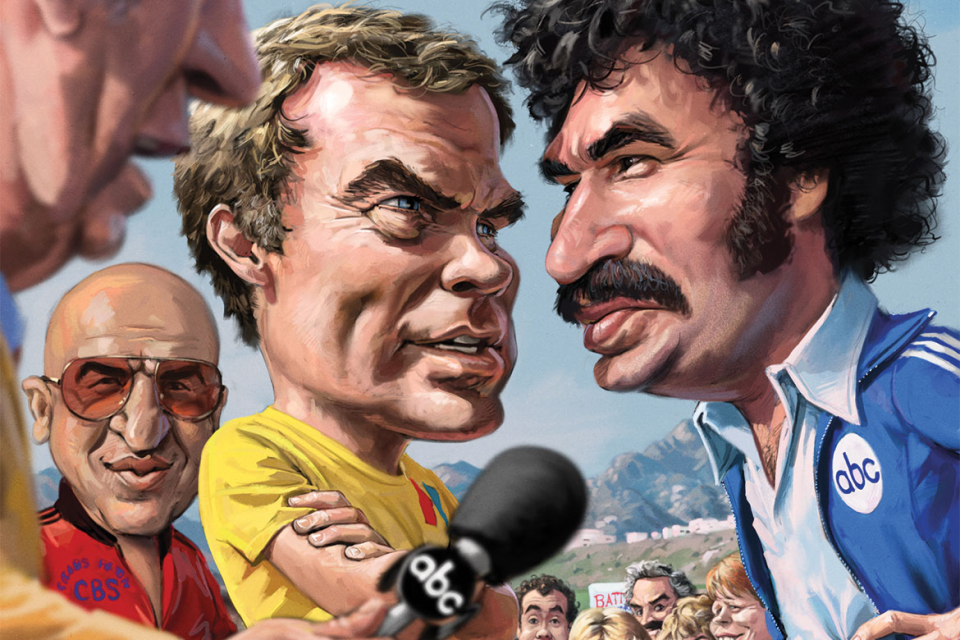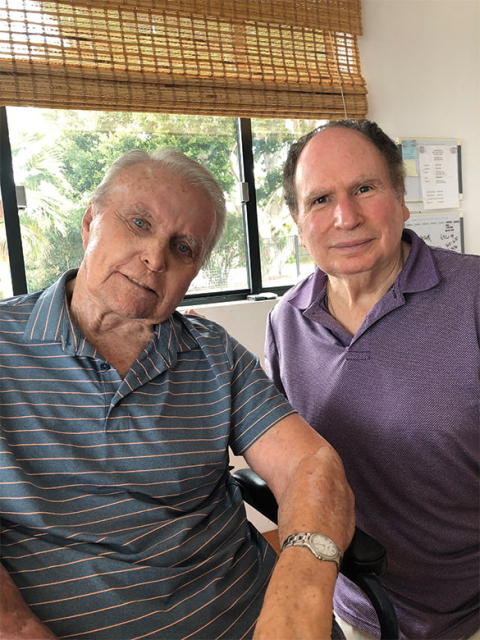In late 2018, I went to have lunch with Robert Conrad, a man I once thought might kill me on national TV.
Conrad was a fiery guy, and we'd had a few words on-and off-camera on ABC's first Battle of the Network Stars. Our controversy has been the subject of countless mentions over the last 40 years, but this would be the first time we'd ever broken bread. I'd always had questions for him. I assume he felt the same way, given his immediate "yes" when I asked through an intermediary if he would like to finally get together.
Lunch was at his house. Conrad had been injured in a bad traffic accident that left him partially paralyzed, and he'd later experienced a stroke. We greeted each other warmly, but had he really mellowed? This was still Robert Conrad.
Flashback to 1976. My agent informed me that ABC wanted me to participate in Battle of the Network Stars. It was pitched to me as a two-day primetime celebrity sports show, a totally new animal.
The only previous effort at reality had been PBS's An American Family, which detailed seven months in the life of the Loud family of California. It had aired in 1973 to mixed reactions, and the networks weren't jumping into the reality TV business.
This idea was to apply the concept of ABC's The Superstars to the biggest television stars. At the time this was easy — there were only three networks, compared to the 10,000 we have now. My show, Welcome Back, Kotter, being in the Top 20, qualified me as a participant. It would be a series of athletic competitions.
Also added would be the normal chazerai of the day: Rona Barrett Interviews, Joyce Brothers channeling Freud and quietly informing us why celebrities might subject themselves to this, and costumed ABC promo characters dancing to "The Hustle." Each network would have its own team: ABC, CBS and NBC. No UHF stations. If we couldn't get reception, they weren't getting teams.
Each team had six men and four women. One captain was selected for each team. Telly "Kojak" Savalas was the captain of the CBS team. Two years earlier, he'd parlayed his TV popularity into a Vegas nightclub act, and he'd picked me as his opening comic. He Rex-Harrison'ed his way through a mix of standards and original songs. We shot craps a few times and got along well.
Conrad was NBC's captain. He was starring in Baa Baa Black Sheep after enormous success in the '60s with The Wild Wild West. He liked doing shows where one word was repeated in the title. The Wild Wild West was one of my all-time favorite TV programs.
I became captain of the ABC team after Robert "Baretta" Blake and Lee "The Six Million Dollar Man" Majors had both turned it down. Savalas and Conrad were first-round picks; I went in the bottom of the third. I was an introverted comedian who'd accidentally become a TV star.
I thought this gig might be above my paygrade, but my agent convinced me to go forward: "How bad can it be? People are people." I laughed and said, "Celebrities aren't people." He said, "They're kind of like people."
The main reason I accepted was that I knew most of my team. I saw Bobby Hegyes — aka Juan Epstein — every day on the Kotter set. I'd met Farrah Fawcett when she auditioned to be my wife on Kotter. (For her sake, it was great she didn't get the part, because she booked Charlie's Angels weeks later.)
I also crossed paths with Wonder Woman's Lynda Carter, Ron Howard from Happy Days, Hal "Barney Miller " Linden and Penny Marshall — Laverne of Laverne and Shirley. Penny was a riot. She would call every Christmas to discuss the presents ABC gave its stars. In that voice that couldn't have belonged to anybody else: "Hi, Gabe, I got a shitty bathrobe. What did they give you?"
There were a few stars on my team I didn't know. Darlene Carr and Richard Hatch were both on The Streets of San Francisco. Rounding out the ABC team was John Schuck. He was on something called Holmes & Yoyo. I never watched it, but for some reason, I imagined that show was a comedy about Sherlock Holmes with a dumb assistant. I later found out it was about a detective with an android partner.
With my team assembled, I figured it was time to act like their captain. I mustered up the courage to get everyone's phone number. With an, "Um, hi, this is Gabe Kaplan," I asked in which events each person would like to compete. Some were specific, some said that they'd fill in wherever necessary, and all were friendly.
Farrah had heard that Conrad was holding practices for the NBC team. I wondered how long his preseason was. I got the feeling Telly was not having a preseason.
Legendary ABC sportscaster Howard Cosell was going to commentate. This choice heightened the stakes, as he was the day's most eminent sports broadcaster. We'd both grown up in Brooklyn and enjoyed talking about the great old Brooklyn athletes. I went to Erasmus Hall; he went to Hamilton. In Howard's day, the two high schools were bitter rivals.
The show was to be filmed at Pepperdine University in Malibu. I remember driving onto the campus that first morning and running into Howard, who said, "I look forward to BROAD-cast-ING the to- TAL IN–ep-TI-TUDE an Erasmus ALUM-nus will display today." Then he went into the Erasmus cheer: " Vevo, Vivo, Vevo, Vivo, Vest. E.R. — A.S. — M.U.S."
As enticing as the sight of Howard going into 1940s cheerleader mode was, my mind was occupied with the events of the day.
Most of the ABC team was already there by the time I got to the locker room. There was a congenial atmosphere with a twinge of nervousness. I surprised myself by having the skills to calm a few people down. Why was I sweating being captain? It seemed like I had this.
In addition to the locker room, each team had a large trailer close to the field. Each star received a big duffel bag with clothing, paraphernalia and other swag. Penny was the first person I thought of: "Look at all the shit the network's giving you now." She was happy — no bathrobes this time.
Our team's jerseys were blue and had our individual names printed on them. It was a nice touch, but I felt more like a Mouseketeer than an athlete. I suggested we run onto the field together like a hyped-up college football team. Farrah shot me a look as if to say, "Are you serious?" I led the ABC team onto the field, walking.
When we met the other teams, there was a palpable tension in the air. It felt like high school. I spotted Telly and went over to say hello. It was the first time I'd seen him since Vegas. The conversation was polite but flat.
I expected a "congratulations" for Kotter getting on the air. Instead, we talked as he stared into the distance with a half-smile, smoking his cigarette. I felt like saying, "Hey, buddy, you could be a little friendlier, I had to listen to your Vegas act for two weeks."
Right after that, I met Conrad. He looked me up and down for a second, and that was it. No chance for any Wild Wild West conversation. These guys had their game faces on.
Golf was the first event. The target was a makeshift hole about 60 yards away. Our golfers were Farrah and Ron. They clearly had the best form, but we came in last. Where were the form judges? Swimming was next. Both Telly and Conrad swam for their team, and they were both smoking before the race. I guess that was 1970s cardio prep.
Lynda and Penny got us off to a good start. However, in the middle of his leg, Bobby Hegyes just ran out of gas. To quote Cosell, "HEG-yes has died." We came in last, again. Tennis and the bike race were next, and as consistency was very important to us, we continued to drag up the rear. At the conclusion of day one, the ABC team was firmly in last place. I contributed nothing as a captain or participant.
Day two seemed hopeless, but at least I avoided Cosell's Brooklyn trash talk on the way in. CBS was in first place and NBC was second. We had to win three events to qualify for the tug-of-war finale, which pitted the top two teams against each other. The first event of the day was the six-person running relay.
It's funny; people still associate me with a guy who has a lot of hair because of Gabe Kotter's bushy 'do. Ironically, at this time, I had been losing my hair for 10 years and had a bald spot on the front of my head. I had gotten some hair transplants a few years earlier, and they now sprouted out like a Chia Pet.
When Harry Blake, Kotter's great makeup artist, suggested I get a front hairpiece that he could attach to the transplants without tape, I followed his advice. It clipped directly onto the transplants, blended in perfectly and looked totally natural.
The only problem was that it didn't have much support. The back was at risk of flipping over because it was only attached to the front transplants. And if it did flip over, would America recover from the sight of a balding Mr. Kotter?
I had debated if I should wear the piece for Battle. Aside from swimming (which I didn't participate in), the only other hair-endangering activity was running. I practiced sprinting with the hairpiece to see if it would make a break for it. It held steady, and I decided to take a chance and compete with it on.
Our women — this time, Penny and Darlene — started us off once again with great success. Hegyes was next. He seemed to think if he moved his head up and down and side to side with great vivacity, it would create an aerodynamic phenomenon that would propel him the distance. It didn't work.
By the time he handed me the baton, I was a long way behind Conrad, who was also running his team's fourth leg. I ran as fast as I could while concentrating on keeping my head straight. I made up some ground, but we were still in terrible shape.
Then we caught a break. Conrad was too forceful when he handed the baton to Joanna Pettet, who was representing the miniseries Captains and the Kings. He knocked her down and then went sprawling himself. As he was helping her up, I was already handing off to Ron Howard. We managed to take the lead as Ron put a solid gap between himself and Joanna, who was struggling to finish.
NBC's final runner, Ben Murphy — who was starring in the series Gemini Man at the time — backtracked and grabbed the baton from Joanna before she had even finished her leg. Our anchor, Richard Hatch, had a sizable head start, but Ben was able to catch him before the finish line. NBC won.
We were a close second, CBS a distant third. It was deflating. I thought it was over. It didn't matter if we won everything else — there weren't enough points left to earn. It was going to be CBS and NBC in the tug-of-war. ...
For the rest of the story, and some fun footnotes, pick up a copy of the latest emmy magazine HERE
This article appeared in its entirety in emmy magazine, Issue No. 4, 2021


